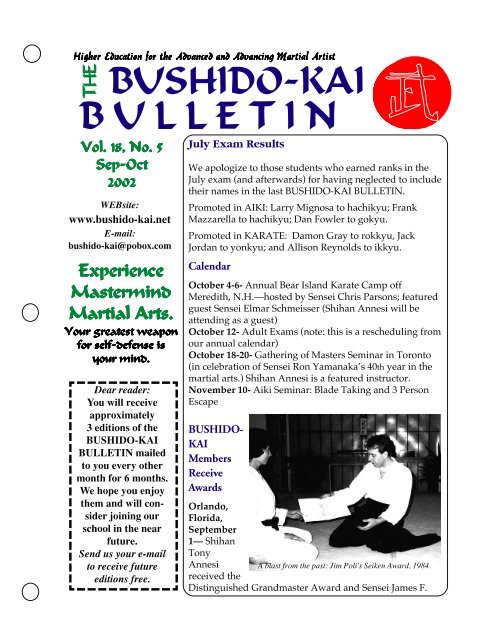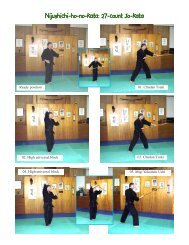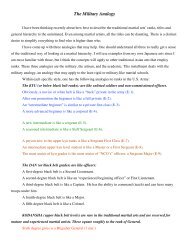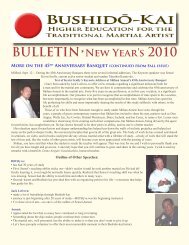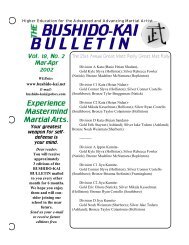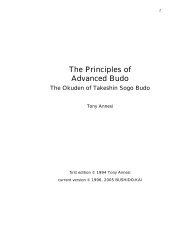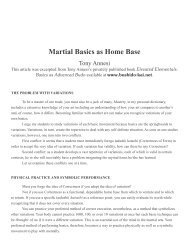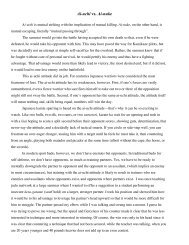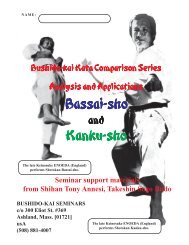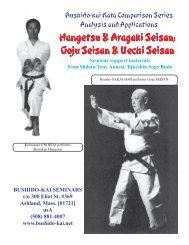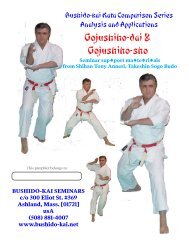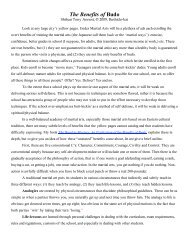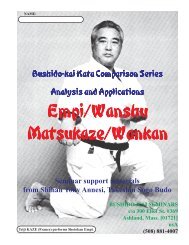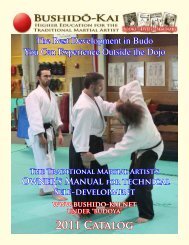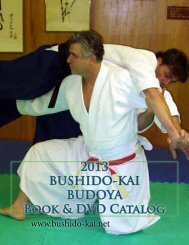Bulletin Sep & Oct 2002 - Bushido-Kai
Bulletin Sep & Oct 2002 - Bushido-Kai
Bulletin Sep & Oct 2002 - Bushido-Kai
You also want an ePaper? Increase the reach of your titles
YUMPU automatically turns print PDFs into web optimized ePapers that Google loves.
Higher Education for the Advanced and Advancing Martial Artist<br />
BUSHIDO-KAI<br />
B U L L E T I N<br />
THE<br />
Vol. 18, No. 5<br />
<strong>Sep</strong>-<strong>Oct</strong><br />
<strong>2002</strong><br />
WEBsite:<br />
www.bushido-kai.net<br />
E-mail:<br />
bushido-kai@pobox.com<br />
Experience<br />
Mastermind<br />
Martial Arts.<br />
Your greatest weapon<br />
for self-defense is<br />
your mind.<br />
Dear reader:<br />
You will receive<br />
approximately<br />
3 editions of the<br />
BUSHIDO-KAI<br />
BULLETIN mailed<br />
to you every other<br />
month for 6 months.<br />
We hope you enjoy<br />
them and will consider<br />
joining our<br />
school in the near<br />
future.<br />
Send us your e-mail<br />
to receive future<br />
editions free.<br />
July Exam Results<br />
We apologize to those students who earned ranks in the<br />
July exam (and afterwards) for having neglected to include<br />
their names in the last BUSHIDO-KAI BULLETIN.<br />
Promoted in AIKI: Larry Mignosa to hachikyu; Frank<br />
Mazzarella to hachikyu; Dan Fowler to gokyu.<br />
Promoted in KARATE: Damon Gray to rokkyu, Jack<br />
Jordan to yonkyu; and Allison Reynolds to ikkyu.<br />
Calendar<br />
<strong>Oct</strong>ober 4-6- Annual Bear Island Karate Camp off<br />
Meredith, N.H.—hosted by Sensei Chris Parsons; featured<br />
guest Sensei Elmar Schmeisser (Shihan Annesi will be<br />
attending as a guest)<br />
<strong>Oct</strong>ober 12- Adult Exams (note: this is a rescheduling from<br />
our annual calendar)<br />
<strong>Oct</strong>ober 18-20- Gathering of Masters Seminar in Toronto<br />
(in celebration of Sensei Ron Yamanaka’s 40th year in the<br />
martial arts.) Shihan Annesi is a featured instructor.<br />
November 10- Aiki Seminar: Blade Taking and 3 Person<br />
Escape<br />
BUSHIDO-<br />
KAI<br />
Members<br />
Receive<br />
Awards<br />
Orlando,<br />
Florida,<br />
<strong>Sep</strong>tember<br />
1— Shihan<br />
Tony<br />
Annesi A blast from the past: Jim Poli's Seiken Award, 1984.<br />
received the<br />
Distinguished Grandmaster Award and Sensei James F.
2 BUSHIDO-KAI BULLETIN<br />
EXPERIENCE<br />
Effective,<br />
Efficient,<br />
Always<br />
Interesting<br />
“MARTIAL<br />
ARTS for<br />
MIND as<br />
well as<br />
MUSCLE.”<br />
***<br />
Not sure of the<br />
overwhelming<br />
quality of our<br />
instruction?<br />
Try a video<br />
first.<br />
Go to our<br />
WEBsite for<br />
educational<br />
products<br />
drawn from<br />
our in-house<br />
seminars.<br />
Poli, Jr. (aiki yondan and karate sandan, head<br />
instructor of Renrikan Dojo in South Boston)<br />
received Outstanding Instructor Award at The<br />
World Head Family Soke-ship Council’s formal<br />
dinner.<br />
Framingham, Mass., <strong>Sep</strong>tember 5— Bridget J.<br />
Gassner, aiki and karate shodan, received a<br />
special framed certificate signed by both<br />
Shihan Annesi and Sensei Poli for Loyalty and<br />
Service to BUSHIDO-KAI.<br />
WHFSC Meeting and Awards Dinner<br />
Orlando, Florida, August 31 to <strong>Sep</strong>tember 1—<br />
Shihan Tony Annesi and Sensei Jim Poli arrived<br />
in Orlando 2 days early to get a little R&R<br />
before the World Head Family event. On Thursday<br />
and Friday, they attended Universal<br />
Studio’s two theme parks as well as Cirque de<br />
Soleil at Downtown Disney.<br />
On Friday evening, theirs was the second minidemonstration<br />
for the WHFSC. Shihan Annesi<br />
emphasized the theme of “all martial arts have<br />
elements of others.” He explained that martial<br />
artists can practice a broader spectrum of skills if they learn how to<br />
interpret their art. He performed part of Uechi Seisan and then used<br />
movements form the kata to show how both karate and aiki could<br />
be discovered within an art that most were unfamiliar with. Numerous<br />
other masters performed or taught that evening as well as the<br />
following morning and afternoon. Among them were: Grandmaster<br />
Vincent Marchetti, Master Robert Castro,<br />
Professor John Casarez, Grandmaster<br />
Ron Van<br />
Many other<br />
titles are<br />
available,<br />
as well.<br />
Clief, Grandmaster<br />
Ernesto Presas, Sensei<br />
Ric Pascetta, Professsor John Denora, Hanshi<br />
Bruce Juchnik, Kwang Jang Nim Ian A. Cyrus, Professor Dan<br />
Anderson, Grandmaster Gary Alexander, Grandmaster Chaka Zulu,<br />
and Grandmaster Bobby Toboada.<br />
The Dojo Files<br />
The second volume of Tales of the Dojo has been titled The Dojo Files. Here<br />
is another selection from that new book by Shihan Annesi.
BUSHIDO-KAI BULLETIN 3<br />
TESTING THE TOURNAMENT TROPHY<br />
To refuse awards is another way of accepting them with more noise than is normal. — Peter Ustinov<br />
People with honorary awards are looked upon with disfavor. Would you let an honorary mechanic fix your<br />
brand-new Mercedes? — Neil Simon<br />
My career with martial arts competition began with sport judo during the 1964-<br />
65 school year. I don’t even remember entering the tournament but I recall that it was a<br />
“given”—all students must compete. The rah-rah high school part of me was all for that;<br />
the rebellious college part of me didn’t like the dictatorial sound of “must.” Of course,<br />
no one really said, “must.” Rather they implied that your promotion would be positively<br />
effected by your entering competition regularly. “Regularly” meant as often as<br />
once a month. How I was going to juggle mid-terms with judo competitions, I did not<br />
consider.<br />
My first match took place on Mat One of Tohoku judo club in Somerville, a<br />
converted church with dojo upstairs and down. The upstairs dojo had a large canvascovered<br />
mat built on truck springs and divided into two competition areas. My mom,<br />
dad and aunt had driven me from my dorm to spectate. In my six years of junior high<br />
and high school football and my three years of gymnastics, this was only the third event<br />
my parents had witnessed. Of course, I wanted to look good.<br />
The referee called “Hajime!” and I approached my U. Mass. adversary. Upon our<br />
mutual touch, I threw a right sasae-tsuki-komi-ashi and my foe fell at my feet. The referee<br />
called “Ippon! De-ashi-barai!” and I was victorious in my first five seconds of play. The<br />
reason he identified the technique incorrectly was not because of my form but because I<br />
had hit my opponent’s ankle just before he had put weight on it and sent his legs out<br />
from under him as in a sweep (de-ashi-barai) rather than tilting him over his own forward<br />
foot as in a prop (sasae-tsuri-komi-ashi). Understandable. But it was also my first<br />
experience with a judge’s imprecision.<br />
As quick as my first match was, my next two were horrifically slow. I had drawn<br />
a larger, older, more experienced competitor from Massasoit Judo Club. We were both<br />
white belts but he had undergone at least a year of this competition stuff. At the end of<br />
regulation time we were tied, waza-ari to waza-ari (a half-point each). Then we went into<br />
overtime. No further points. Second overtime. Still hikiwake (a draw). The referee asked<br />
for a corner judge’s decision and the match went to the older guy. Okay. A judgment<br />
call. I could handle that. I suppose that if the edge was to go to someone, it should be<br />
the senior. Why they couldn’t simply write down “tied,” on the score sheet, I did not<br />
understand but did not question. After about fifteen minutes, my third match was<br />
called. Evidently, I had made it to the quarter-finals. Another Massasoit guy named<br />
Jimmy Pedro. Years later he and his son were both to make names for themselves in<br />
sport judo. But today he just seemed like another tall, more experienced white belt.<br />
By the end of regulation time, my hands could barely grip his gi jacket and my<br />
arms felt like they were carrying wet laundry. Hikiwake (Tie)! Overtime was announced.<br />
If this was what they meant by sudden death, why was it taking so long? Another draw!<br />
Then, near the end of the second overtime, Jimmy threw me for his second half-point.<br />
No, said the referee, not clean enough. Ten seconds to go. One attempt at harai goshi<br />
(sweeping hip). One failure. Another attempt. No Luck. “Soremade! It’s over! Judges
4 BUSHIDO-KAI BULLETIN<br />
into the center!” Oi! Another judges decision. And another victory for Massasoit.<br />
I was not really disappointed. I was exhausted. Charlie Chaves, my instructor at<br />
Tohoku, walked over to my dad and me after the competition. “Your son won both his<br />
matches!” said he. Perhaps Charlie was just being sensitive about the decisions not<br />
falling to Tohoku. But it seemed like a darn nice thing to say at the time.<br />
The next month, I was out of the competition early because my opponent had<br />
used an illegal (supposedly) choke across my windpipe. I complained in the locker<br />
room and the guys just shrugged. Three lessons to be learned here: (1) do not depend<br />
on referees to win a match, (2) the rules are the rules only when both parties and the<br />
referees agree that they are, and (3) don’t bitch and moan after the fact, if you lose. Even<br />
if you are right, you likely to look like a powder puff.<br />
I was slowly loosing my taste for competition. Not because I did not win consistently,<br />
but because I could not depend on consistency from match to match. As things<br />
turned out, once I graduated college, I joined a more local club The Framingham Martial<br />
Arts Club under the direction of Larry Garron. The only competition here was inhouse<br />
and it was much less stressful. Occasionally, we had some interaction with our<br />
sister club 20 miles away but the judo we did was not so much competition as it was<br />
practice randori (freestyle).<br />
I recall doing randori with many of the juniors during a weekend long gashuku<br />
(training camp) held at our sister school. I would go at half-effort to give the juniors a<br />
chance at applying their waza. “Good!” I’d encourage them, “Nice try. Turn more next<br />
time,” or “Good! But get a little lower.” Unbeknownst to me, a little illness had crept<br />
upon me. It was the martial artist's worst enemy and it was the inevitable reward for<br />
years of maturity in the arts: the illness of comfort and complacency. When it came to<br />
sparring Al, who was my size and rank, I was faced with undeniable conclusion that I<br />
could barely hold my own. A couple of years of not worrying about referees, not having<br />
my hands cramp up and not going home dragging my sweaty gi at my heals had made<br />
me...well...soft. I was experienced but not in good enough shape to spar.<br />
I knew that I could not continue competing ad infinitum just to feel “on my<br />
game,” but I didn’t want to go on training knowing that I was constantly “off my<br />
game.” Then and there I designed a new goal for myself. Never be more than a few<br />
weeks out of competitive shape for your age. The lower the age, the shorter the weeks it<br />
should take to be at peak.<br />
Now, admittedly when you are past 50, with a few decades of bruises, twists,<br />
sprains and other physical challenges, you may not be in the best shape to compete—<br />
even if you are at peak. But keeping tabs on yourself is a healthful discipline. Knowing<br />
that at 30 you could get up for a match in, say, 3 weeks, boosts your confidence and<br />
keeps you a little more honed than if you figure you have made it to martial arts Easy<br />
Street.<br />
When I first learned karate, Sensei did not emphasize freestyle sparring. In fact,<br />
we were not allowed to freestyle until green belt level. In my first karate match, I threw<br />
Richard, my senior, with a de-ashi-barai (or was it a mis-timed sasae-tsuri-komi-ashi?) and<br />
felt immediately confident about my karate skills. But a year later, when a visiting<br />
brown belt came in from the mid-west and did some very light sparring with us, my<br />
confidence dissolved. Unlike us, his dojo would spar nearly every class. And he would
BUSHIDO-KAI BULLETIN 5<br />
go to tournaments nearly every weekend. He was not big, strong, fast or tricky—just<br />
well-seasoned. And he scored on me with ease.<br />
“You guys ought to spar more,” was all he said. It had never occurred to us to<br />
spar informally before or after class! Okay, another lesson learned. I was not out of shape<br />
but neither did I have the experience needed to engage in karate matches. Just the opposite<br />
lesson from what I had learned years before in judo.<br />
Still, I favored my sensei’s emphasis. Karate, after all was for character building<br />
and for self-defense, not for trophies. Many years later, I wondered, as I sparred my<br />
students in class, if I had been missing something. I certainly had more sparring experience<br />
by now but had never officially entered a tournament. I wondered if, down deep, I<br />
was just plain scared—not of getting hit, not even of losing, but of not doing well. I<br />
remember local Uechi instructor Walter Mattson telling me that although he had enjoyed<br />
a very successful tournament career in the sixties, at one point he wondered what he<br />
could do today at age 40. Without giving me the gory details, he said that things had<br />
changed quite a bit and he had not done well in his comeback tournament. So maybe I<br />
was a little scared. All the more reason to enter a tournament.<br />
As a child my mom and dad had taken me on a roller coaster at far too young an<br />
age and it absolutely freaked me out. I did not go on a full-fledge roller coast again for<br />
decades. I did not even enjoy comparatively tame Ferris wheels. Then, one day, knowing<br />
that the rest of the world, even kids, could go on roller coasters, I just bit the bullet and<br />
took on every ride in the park. I still don’t get my heart aflutter over roller coasters but at<br />
least now I am not afraid of them. I have a choice.<br />
At the age of 42, I entered a Spring invitational tournament. The kata competition<br />
came prior to the free sparring. I won second place doing Unsu (Cloud Hand). The tournament<br />
director’s visiting instructor gave me a thumbs up. He especially liked some<br />
dynamic tension at the end of the kata. “That’s what karate is all about,” he said. I was<br />
not sure if he meant karate was all about dynamic tension or doing respectable kata.<br />
Then came the senior (over 35 years of age) sparring division. I sparred younger<br />
men but managed to make it to the finals and then scored my third point on a round kick<br />
that my opponent did not expect form a Japanese stylist. First place.<br />
Not convinced that my win was anything but a fluke, I entered again the next<br />
year. Eliminated in the first round.<br />
Then, the third year: first place again. Okay. Test complete. I knew the following:<br />
(1) win or lose, I was no longer afraid of karate tournaments, (2) I could get ready for a<br />
tournament with a month or so of preparation, and (3) you can’t build your character if<br />
you don’t test your weaknesses.<br />
What about self-defense? Surely, I still believed that tournaments have little, if<br />
anything, to do with self-defense. Well, almost.<br />
Tournament techniques and free sparring itself is, in my opinion, a very small part<br />
of self-defense. It helps build reactions, develop strategy, and may even help with conditioning.<br />
But it does not simulate a realistic self-defense situation. However, it does put<br />
one on the line. It gives a little hint of the pressure one might feel if faced with a nogoodnik.<br />
It provides a test. Passing that test is not required for the learning of karate but<br />
ignoring the test because of fear, minor apprehension or even a little uncertainty is not<br />
advantageous to the development of the self.<br />
And that is what karate is all about.
6 BUSHIDO-KAI BULLETIN<br />
FOR GOAL-ORIENTED STUDENTS!<br />
In <strong>Sep</strong>tember, BUSHIDO-KAI initiated two new clubs-within-a-club for adult students.<br />
Mudansha (non-black belts) will be eligible the BLACK BELT CLUB for those students<br />
who aim to work on a regular basis for the attainment of shodan (first degree black<br />
belt). Yudansha (black belt holders) will be eligible for THE MASTERS CLUB, for those<br />
serious about attaining godan (5th degree black belt), the minimum rank needed to<br />
attain the title of Shihan or master. Membership in each club within BUSHIDO-KAI<br />
will require an additional fee and will have additional benefits such as private lessons,<br />
price reductions on videos and equipment, special seminars, reduced exam fee, etc.<br />
Detailed information will be available at the dojo. Interested parties should join these<br />
beneficial clubs for goal-oriented students before December 31, <strong>2002</strong>.<br />
KENKYUKAI REMINDER!<br />
Annual federation dues are submitted each year prior to November<br />
1 for the next calendar year. After November 1, <strong>2002</strong>, late fees will<br />
apply. Please attend to your annual federation dues as soon as<br />
possible.<br />
BUSHIDO-KAI ADS in local TAB Newpapers!<br />
Look for BUSHIDO-KAI's "A Martial Arts Education" in an articleadvertisement<br />
format in the Ashland TAB, Holliston TAB and the<br />
Dover-Sherborn Press.<br />
"When the<br />
student is<br />
ready,<br />
the teacher<br />
will appear."<br />
BUSHIDO-KAI<br />
HOMBU DOJO<br />
92 Blandin Ave.<br />
Suite 26<br />
Framingham,<br />
Massachusetts<br />
(01702)<br />
To:<br />
To observe a class, call<br />
508 879-7622


